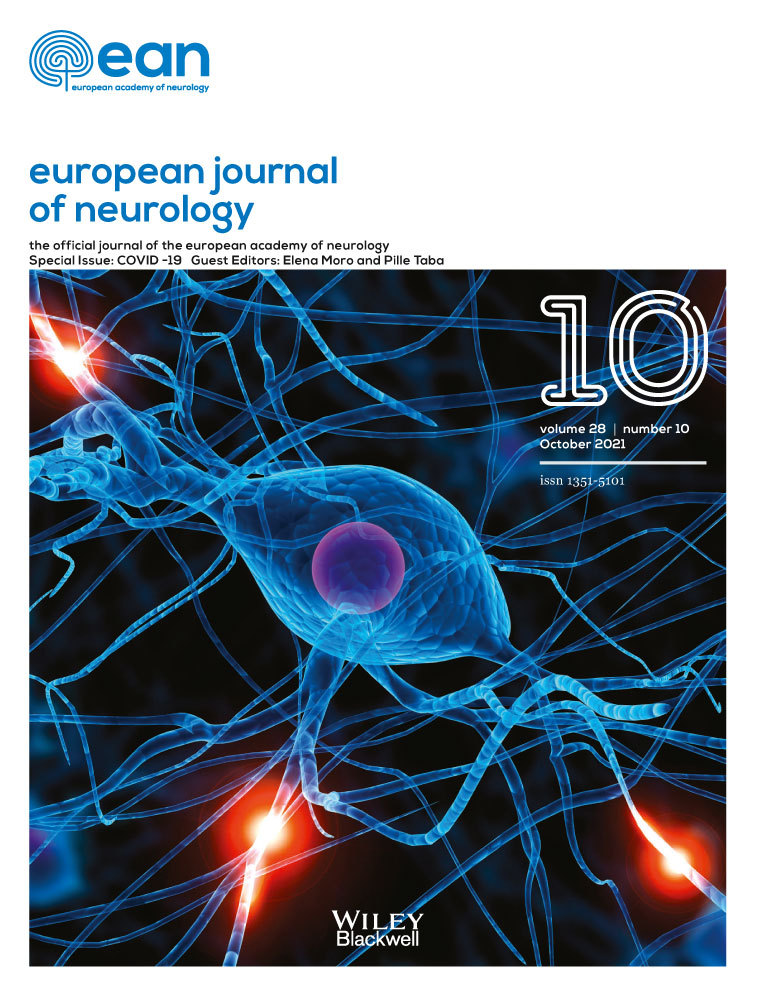COVID-19 pandemic and mental distress in multiple sclerosis: Implications for clinical management
Abstract
Background and Purpose
In multiple sclerosis (MS), disease-related factors and dysfunctional coping might favor the development of mental distress induced by COVID-19 containment measures. Aim of this study was exploring the relationship between disability, coping strategies, daily life reorganization and neuropsychiatric symptoms in an Italian MS population during the COVID-19 lockdown, in order to identify potentially modifiable factors that could inform clinical management of mental distress in people with MS.
Methods
We explored the relationship between mental distress, disability and coping strategies in the Italian MS population under lockdown. Structural equation modeling was applied to information collected via web survey to identify modifiable factors that could account for mental distress.
Results
A total of 845 participants (497 with MS and 348 controls) were included in the study. The MS group had higher scores than the control group for depression (p = 0.005), but not for anxiety, emotional dyscontrol or sleep disturbances. The structural equation modeling explained 74% of the variance observed in depression score. Within the model, three latent factors were characterized from measured variables: motor disability and cognitive dysfunction contributed to disability (β = 0.509 and β = 0.836; p < 0.001); positive attitude and exercise contributed to active attitude (β = 0.386 and β = 0.297; p < 0.001); and avoidance, social support and watching television contributed to passive attitude (β = 0.301, β = 0.243 and β = 0.212; p < 0.001). With regard to the relationship between latent factors and their influence on depression, disability contributed to passive attitude (β = 0.855; p < 0.001), while both passive and active attitude significantly influenced depression (β = 0.729 and β = −0.456; p < 0.001).
Conclusion
As a practical implication of our model, favoring exercise would enhance active attitude and its positive impact on mental well-being while, at the same time, reducing the negative impact of disability on depression, representing a valuable tool in facing COVID-19-related mental distress.
CONFLICT OF INTEREST
T.C. has received honoraria from Roche and Novartis. A.C. has received research grants from ALMIRALL, and honoraria from Novartis, Merck and Biogen. L.L. received speaker honoraria and travel grants from Teva, Merck, Sanofi, Novartis, Biogen, Roche and Bayer. G.B. received fees for consultation and Advisory board from Biogen, Almirall, Novartis, Merck, Teva, Roche and Sanofi Genzyme. L.M. has received speaker's honoraria from the following companies: Biogen, Merck, Novartis, Roche, Sanofi-Genzyme and TEVA. M.I. received research grants from the National Institute of Health, Department of Defense (DOD), National Multiple Sclerosis Society (NMSS), Federazione Italiana Sclerosi Multipla (FISM), and Teva Neuroscience. M. Petruzzo, F.T., A.I., A.N., M.C., G.B., L.R., G.S. and S.B. have nothing to disclose. M.M. has received research grants from ECTRIMS-MAGNIMS, the UK MS Society and Merck, honoraria from Biogen, Merck, Novartis and Roche, and consulting fees from Veterans Evaluation Services. M.F. is Editor-in-Chief of the Journal of Neurology, has received compensation for consulting services and/or speaking activities from Biogen Idec, Merck-Serono, Novartis, Teva Pharmaceutical Industries, and receives research support from Biogen Idec, Merck-Serono, Novartis, Teva Pharmaceutical Industries, Roche, Italian Ministry of Health, Fondazione Italiana Sclerosi Multipla and ARiSLA (Fondazione Italiana di Ricerca per la SLA). R.L. has received personal compensation for speaking or consultancy from Biogen, Teva, Genzyme, Merck, Novartis and Almirall. M. Petracca has received travel grants from Novartis. V.B.M. has received personal compensations for speaking or consultancy from Biogen, Teva, Genzyme, Merck, Novartis and Almirall.




